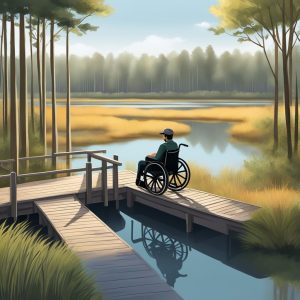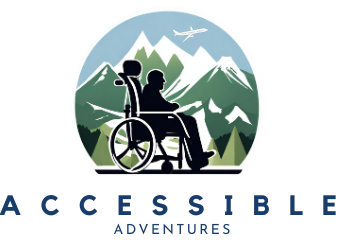Disabled Hunting Opportunities: Accessible Hunting for All Abilities

If you’re a hunter with a disability, you may think that your days of hunting are over. However, there are many opportunities available for disabled hunters to enjoy the great outdoors.
Whether you’re in a wheelchair, have limited mobility, or are visually impaired, there are programs and organizations that can help you get back in the field.
Understanding Disabilities in Hunting is the first step towards finding opportunities that are right for you.
Disabilities can range from physical impairments to cognitive or sensory conditions.
Some hunters may need assistance with mobility, while others may require adaptive equipment to participate in hunting activities.
It’s important to understand your own needs and limitations to find the right program or organization that can help you.
Legal Framework and Licensing can be a confusing aspect of hunting for disabled hunters. However, it’s important to know that the Americans with Disabilities Act (ADA) protects your right to hunt.
Additionally, many states offer special licenses or permits for disabled hunters, which may include accommodations such as hunting from a vehicle or using adaptive equipment.
By understanding the legal framework and licensing requirements, you can ensure that you’re able to hunt safely and legally.
Key Takeaways
- Disabled hunting opportunities are available for hunters with a range of disabilities.
- Understanding your own needs and limitations is important to finding the right program or organization.
- The legal framework and licensing requirements protect your right to hunt as a disabled hunter.
Understanding Disabilities in Hunting
Hunting can be a challenging activity for individuals with disabilities. However, with the right adaptive equipment and techniques, hunting can be a rewarding experience for everyone.
In this section, we will discuss the different types of disabilities and their impact on hunting, as well as the adaptive hunting equipment and techniques available.
Types of Disabilities and Their Impact on Hunting
Individuals with disabilities can face a range of challenges when it comes to hunting. Some of the most common disabilities that can impact hunting include:
- Physical disabilities: These can include mobility impairments, such as paralysis or amputations, that can make it difficult to navigate the hunting terrain or hold and shoot a firearm.
- Sensory disabilities: These can include vision or hearing impairments that can make it difficult to spot or track game.
- Cognitive disabilities: These can include intellectual or developmental disabilities that can impact an individual’s ability to understand hunting safety procedures or follow directions.
Each disability can present unique challenges for hunters. However, with the right adaptive equipment and techniques, many of these challenges can be overcome.
Adaptive Hunting Equipment and Techniques
Adaptive hunting equipment and techniques can help individuals with disabilities participate in hunting activities.
Some examples of adaptive equipment and techniques include:
- Wheelchairs and mobility aids: These can help individuals with mobility impairments navigate the hunting terrain. Some wheelchairs are specifically designed for hunting and include features such as camouflage and gun holders.
- Adaptive firearms: These can include modifications such as extended triggers or sights to help individuals with physical disabilities hold and shoot a firearm.
- Assistive technology: This can include devices such as amplified hearing aids or visual aids to help individuals with sensory disabilities track game.
- Hunting guides: These can be trained professionals who can assist individuals with disabilities in navigating the hunting terrain and tracking game.
It’s important to note that adaptive hunting equipment and techniques are not one-size-fits-all solutions.
Each individual’s needs will vary, and it’s important to work with a professional to determine the best equipment and techniques for your specific needs.
Legal Framework and Licensing
If you are a disabled individual who wants to go hunting, you will need to obtain a hunting license, just like any other hunter. However, there are some special considerations that you should be aware of when it comes to hunting licenses for disabled individuals.
Hunting Licenses for Disabled Individuals
Most states offer hunting licenses for disabled individuals. These licenses are often available at a reduced cost and may come with certain accommodations, such as the ability to use a crossbow or other assistive devices.
To obtain a hunting license as a disabled individual, you will typically need to provide proof of your disability, such as a doctor’s note or disability certification.
Special Permits and Tags
In addition to a hunting license, you may also need to obtain special permits or tags to hunt certain types of game or to hunt in certain areas.
These permits and tags may be available specifically for disabled individuals, or they may be part of a general permit system.
For example, some states offer a special permit for disabled hunters to use a vehicle to access hunting areas. Others may offer a tag that allows disabled hunters to hunt from a stationary vehicle.
Organizations and Support for Disabled Hunters
If you are a disabled hunter looking for support and resources, there are several organizations and programs available to you.
These organizations provide assistance with hunting and shooting sports, as well as community support and rehabilitation programs.
Hunting and Shooting Sports Advocacy Groups
The National Rifle Association (NRA) is a well-known organization that advocates for hunting and shooting sports.
The NRA Adaptive Shooting Program aims to increase access and participation in shooting activities for people with disabilities through specialized equipment and training.
The program also maintains an Adaptive Hunting Database, which lists organizations that provide hunting opportunities for disabled individuals.
Another organization that provides hunting opportunities for disabled hunters is Buckmasters American Deer Foundation (BADF).
BADF’s Disabled Hunter Services was established in 1993 to increase opportunities for hunters with disabilities.
The organization works with commercial outfitters, public and private lands, and Buckmasters chapters to organize as many hunts as possible for disabled hunters.
Community Support and Rehabilitation Programs
In addition to hunting and shooting sports advocacy groups, there are also community support and rehabilitation programs that provide resources for disabled hunters.
Buckmasters chapters, for example, raise funds and work together to meet the needs of disabled hunters in their communities.
These chapters provide financial support for equipment and travel, as well as assistance with hunting and shooting sports.
There are also rehabilitation programs that provide support for disabled hunters.
Outdoors For Our Heroes is a nonprofit organization that supports service-connected disabled veterans on fully hosted quality hunts in an attempt to reconnect with nature.
The organization provides opportunities for these veterans to participate in hunting and shooting sports, as well as other outdoor activities.
Opportunities and Access in Various States
State-Specific Hunting Opportunities
If you are a disabled person looking for hunting opportunities, you will be happy to know that many states offer specialized programs and services.
For example, in Washington State, the Department of Fish and Wildlife offers a variety of accommodations for hunters with disabilities. These include special hunting permits, accessible hunting sites, and adaptive equipment rentals.
Similarly, in Tennessee, the Tennessee Wildlife Resources Agency (TWRA) provides a range of hunting opportunities for people with disabilities.
These include special hunts for wheelchair-bound individuals, as well as hunts for individuals with visual or hearing impairments.
Pennsylvania also offers a range of hunting opportunities for disabled individuals.
The Pennsylvania Game Commission provides accessible hunting sites, special permits, and adaptive equipment rentals. Additionally, the state has a program called “Hunters Sharing the Harvest,” which allows hunters to donate their harvested game to local food banks.
Alabama is another state that offers specialized hunting opportunities for disabled individuals.
The Alabama Department of Conservation and Natural Resources provides accessible hunting sites, special permits, and adaptive equipment rentals. Additionally, the state has a program called “Hunting with Heroes,” which provides hunting opportunities for disabled veterans.
Accessibility and Inclusivity in Outdoor Recreation
In addition to hunting opportunities, many states are also working to make outdoor recreation more accessible and inclusive for people with disabilities.
For example, the Washington State Parks and Recreation Commission offers accessible campsites, trails, and picnic areas.
Similarly, the Tennessee Department of Environment and Conservation offers accessible trails, fishing piers, and campsites.
Pennsylvania also provides a range of accessible outdoor recreation opportunities.
The state has an “Accessible Recreation Opportunities” program, which provides information on accessible trails, campsites, and fishing areas.
Additionally, the state has an “Inclusive Recreation” program, which provides training and resources to help make outdoor recreation more inclusive for people with disabilities.
Alabama is another state that is working to make outdoor recreation more accessible and inclusive.
The Alabama Department of Conservation and Natural Resources offers accessible campsites, fishing piers, and trails. Additionally, the state has a program called “No Limits Outdoors,” which provides outdoor recreation opportunities for disabled individuals.
Frequently Asked Questions
What are the requirements to obtain a disabled hunting permit?
In Illinois, disabled individuals with a Class P2O or a Class P2A card are exempt from a hunting license. However, other states may have different requirements.
It is best to check with your state’s Department of Natural Resources or Fish and Wildlife Service for specific information on obtaining a disabled hunting permit.
How can disabled individuals find accessible hunting opportunities in their area?
The Illinois Department of Natural Resources offers a Disabled Outdoor Opportunities program that provides accessible hunting and fishing opportunities.
Other states may have similar programs, and it is recommended to check with your state’s Department of Natural Resources or Fish and Wildlife Service for information on accessible hunting opportunities in your area.
Are there any organizations that offer grants or financial assistance for disabled hunters?
The Buckmasters American Deer Foundation offers equipment grants, such as mechanical gun rests, for qualified disabled hunters.
Additionally, they host disabled hunts for challenged sportsmen and women in their communities at no charge.
Other organizations may offer similar grants or financial assistance, and it is recommended to research local and national organizations for more information.
What accommodations are available for disabled hunters during their hunting trips?
Accommodations for disabled hunters can vary depending on the hunting location and the specific needs of the individual.
Some accommodations may include wheelchair-accessible blinds, modified vehicles for transportation, and assistance from trained guides.
It is recommended to contact the hunting location or program beforehand to discuss accommodations and ensure a safe and enjoyable hunting experience.
Can disabled hunters legally use modified vehicles for hunting, and what are the regulations?
The regulations for using modified vehicles for hunting can vary depending on the state and the specific modifications made to the vehicle.
It is recommended to check with your state’s Department of Natural Resources or Fish and Wildlife Service for specific information on regulations for using modified vehicles for hunting.
What online resources and communities are available to support disabled individuals in hunting?
The Buckmasters American Deer Foundation offers a Disabled Hunters website. This website provides information on programs, opportunities, and other important resources.
Additionally, the National Wild Turkey Federation offers a Wheelin’ Sportsmen program. This program provides hunting opportunities for individuals with disabilities.
You should research local and national organizations for more information on online resources and communities that support disabled individuals in hunting.
